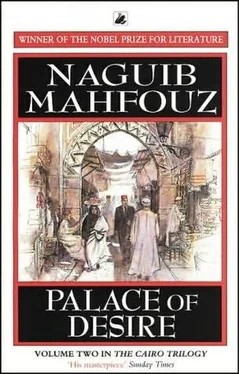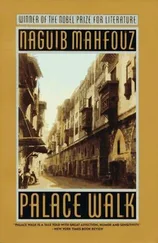Naguib Mahfouz - Palace of Desire
Здесь есть возможность читать онлайн «Naguib Mahfouz - Palace of Desire» весь текст электронной книги совершенно бесплатно (целиком полную версию без сокращений). В некоторых случаях можно слушать аудио, скачать через торрент в формате fb2 и присутствует краткое содержание. Жанр: Современная проза, на английском языке. Описание произведения, (предисловие) а так же отзывы посетителей доступны на портале библиотеки ЛибКат.
- Название:Palace of Desire
- Автор:
- Жанр:
- Год:неизвестен
- ISBN:нет данных
- Рейтинг книги:5 / 5. Голосов: 1
-
Избранное:Добавить в избранное
- Отзывы:
-
Ваша оценка:
- 100
- 1
- 2
- 3
- 4
- 5
Palace of Desire: краткое содержание, описание и аннотация
Предлагаем к чтению аннотацию, описание, краткое содержание или предисловие (зависит от того, что написал сам автор книги «Palace of Desire»). Если вы не нашли необходимую информацию о книге — напишите в комментариях, мы постараемся отыскать её.
, his rebellious children struggle to move beyond his domination, as the world around them opens to the currents of modernity and political and domestic turmoil brought by the 1920s.
Palace of Desire — читать онлайн бесплатно полную книгу (весь текст) целиком
Ниже представлен текст книги, разбитый по страницам. Система сохранения места последней прочитанной страницы, позволяет с удобством читать онлайн бесплатно книгу «Palace of Desire», без необходимости каждый раз заново искать на чём Вы остановились. Поставьте закладку, и сможете в любой момент перейти на страницу, на которой закончили чтение.
Интервал:
Закладка:
A birthday had to be celebrated, even if the birthday boy was the only one at the party. The old house had no tradition of commemorating birthdays. His mother herself did not know this was a day she should not forget. Of the births of her children all she retained were vague memories of the seasons when they had occurred and of the pain accompanying them. The most she could say of his birth was: "It was in winter and the delivery was difficult. My labor pains and screams lasted two days."
Formerly, when he had thought of his birth, his heart had been filled with pity for his mother. When he had witnessed Na'ima's birth, these feelings had intensified, as his heart pounded painfully with sympathy for Aisha. Today he thought of his birth in a new way, for his mind had drunk so avidly from the fountains of materialist philosophy that in two monthshe had grasped ideas mankind had taken a century to develop. He wondered about his delivery and whether part or all of its difficulty was attributable to neglect or ignorance. He asked this as though interrogating a suspect who stood before him. He thought about difficult deliveries, the damage they might cause the brain or nervous system, and the profound effect such injuries could have on the life, destiny, and happiness of the newborn. Might not his exaggerated interest in love be the result of shocks to the top or side of his large head in the hidden reaches of the womb nineteen years before? Why not consider his idealism — which had misled him for so long with ignorant fantasies and induced him to shed countless tears on torment's bloody altar — a sad consequence of the clumsiness of an ignorant midwife?
He thought about the prenatal period, including the time before conception, the uncharted territory from which life sprang, the mechanical and chemical equation to which a living creature could be reduced, the scornful rejection this creature accorded his actual origin from the start as he claimed descent from the stars at which he gazed. Kamal had learned that his origin was not nearly so remote. It was something called sperm. Nineteen years and nine months before, he had been nothing but a drop of sperm ejected because of an innocent desire for pleasure, a pressing need for solace, a bout of excitement inspired by an intoxication extinguishing common sense, or even a feeling of obligation toward a wife who was confined to the house. To which of these did he owe his conception? Perhaps duty had caused him to come into the world, for he was haunted by a concern for doing his duty. He had not allowed himself certain pleasures until they presented themselves as a philosophy he ought to follow and a view he should adopt. Even then, he had engaged in a painful struggle with himself first. His approach to life was hardly one of carefree abandon.
Sperm penetrated a living creature, found the ovum in the Fallopian tube, and fertilized it. Then they slid together into the womb, where they changed into a fetus, which developed flesh and bones. This creature then emerged into the light, causing pain it could not appreciate. It started crying even before its features could be seen clearly. The development of its instincts gave rise in time to so many beliefs and ideas that it was crammed with them. It fell in love and as a result claimed to partake of the divine. Then it was badly shaken, its beliefs were destroyed, and its thoughts were turned upside down. Itsheart was broken, and it was reduced to a humbler status than its initial one.
In this manner nineteen years had passed… what a long period! Youth fled with the speed of lightning. What consolation was left, besides enjoying life hour by hour and even minute by minute until a crow's call heralded the end?
The age of innocence was over. He had reached a stage of life in which he dated things by love: B. L. and A. L. Today he was conscious of many desires, but the identity of his beloved was unknown. The closest he could come to identifying his beloved was through attribution to it of some divine names, like truth, the joy of life, and the light of knowledge. It seemed his journey would be long. His lover appeared to have boarded the train of Auguste Comte and passed by the station of theology, where the password was "Yes, Mother". This train was now traversing the realm of metaphysics, where the password was "Certainly not, Mother". In the distance, visible through a telescope, was the mountain of reality on which was inscribed its password: "Open your eyes and be courageous."
He stopped in front of the desk and fixed his eyes on the diary, wondering whether to sit down and allow his pen to record whatever it chose for his birthday or to postpone that until his ideas had crystallized. Hearing the drone of falling rain, he glanced at the panes of the window overlooking Palace Walk. He noticed pearly drops clinging to the surface of the glass, which was misty from the humidity in the air. A pearl soon slid to the bottom, tracing on the surface a bright line with a curving path like a shooting star's.
Kamal went to the window and looked up at the raindrops pouring from the heavy clouds. The heavens were united with the earth by these glittering threads. The minarets and domes of the district seemed oblivious to the rain, and the horizon behind them resembled a silver frame. The entire scene was washed with a white blended with the brown of teak, a combination suitable for exalted dreams. The cries of children rose from the street. Kamal glanced down and saw the earth streaming with water and mud. Carts were moving with difficulty, their wheels spattering everything in reach. The shops had withdrawn their outdoor displays, and pedestrians sought refuge in shops and coffeehouses or under balconies.
This view of the sky struck a responsive chord in Kamal's mind. What could be more appropriate than drawing inspiration from it as he contemplated his situation at the beginning of another year of his life? Since Husayn Shaddad had left his homeland, Kamal no longer had a companion with whom he could discuss his spiritual secrets. He had to mull them over by himself if he felt a need for discussion. Since his soul mate had left him, Kamal had been forced to make his own soul his companion.
He asked his spirit, "Do you believe in the existence of God?"
When his spirit's turn came, it asked, "Why don't you jump from star to star and planet to planet as you do from one step to another on the stairs?"
It also inquired about the chosen elite among the self-proclaimed descendants of the heavens who had elevated the earth to a central place in existence, making even the angels bow down to Adam's clay. Then their brother Copernicus had returned earth to the status originally granted it by existence as nothing more than the sun's small servant. He was followed by his brother Darwin, who exposed the secrets of man, this bogus prince, announcing for all to hear that man's true ancestor was the ape held captive in a cage in the zoo, where man invited his friends to gawk at it during holiday excursions.
"In the beginning, the universe was one large nebula. Then stars spread out from this center as if spattered into space by the rotating wheel of a bicycle. Through the eternal interplay of gravitational fields, these stars gave birth to planets. The earth itself was flung out like a molten ball trailed by the moon, which teased the earth by frowning at it with one side of its face and smiling with the other. When the earth's fire cooled, its features assumed their permanent shape as mountains, plateaus, plains, and rock formations. Then life crept forth. Crawling on all fours, earth's son arrived, questioning anyone he encountered about high ideals.
"I won't hide my impatience with legends. In the immense raging wave, I discovered a three-sided rock, which from now on I'll call the rock of knowledge, philosophy, and idealism. Don't say that philosophy, like religion, has a mythical character. It rests on solid, scientific foundations and advances systematically toward its objectives. Art is an elevated form of entertainment and enhances life, but my aspirations stretch beyond art. What I want is to draw inspiration only from the truth. Compared with truth, art seems an effeminate pursuit. To attain my goal, you'll find I'm prepared to sacrifice everything except life itself. My qualifications for this important role include a large head, an enormous nose, disappointment in love, and expectations of ill health. Be careful not to mock youthful dreams, for that's a symptom of senility. People affected by this disease term their sarcasm Wisdom.' There's nothing to prevent a sensible person from admiring Sa'd Zaghlul as much as, Copernicus, the chemist Ostwald, or the physicist Mach; for an effort to link Egypt with the advance of human progress is noble and humane. Patriotism's a virtue, if it's not tainted by xenophobia. Of course, hating England is a form of self-defense. That kind of nationalism is nothing more than a local manifestation of a concern for human rights.
Читать дальшеИнтервал:
Закладка:
Похожие книги на «Palace of Desire»
Представляем Вашему вниманию похожие книги на «Palace of Desire» списком для выбора. Мы отобрали схожую по названию и смыслу литературу в надежде предоставить читателям больше вариантов отыскать новые, интересные, ещё непрочитанные произведения.
Обсуждение, отзывы о книге «Palace of Desire» и просто собственные мнения читателей. Оставьте ваши комментарии, напишите, что Вы думаете о произведении, его смысле или главных героях. Укажите что конкретно понравилось, а что нет, и почему Вы так считаете.












